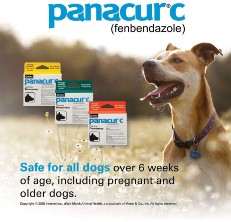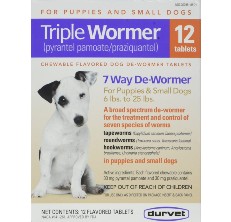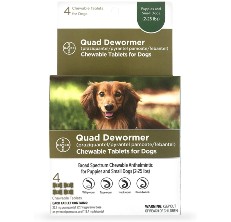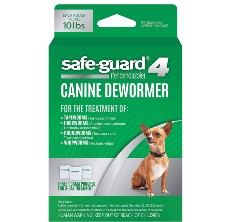- Home
- Gear Categories

Last updated: 8 Jan 2024
We independently research, test, review, and recommend the best products - learn more about our process here. If you buy something through our links, we may earn a commission.
Keep Your Dog Happy and Healthy with The Best Dog Heartworm Medicine
Published 26 Nov 2020
Show contents
Top Dog Heartworm Medicine in 2024
Heartworm disease is a serious disease that can potentially be fatal for your beloved pet. It is transmitted by mosquitoes from one to another and can silently spread throughout your dog’s body before they start to show any symptoms.
These worm-like parasites can directly affect the dog’s heart, lungs, and blood vessels, causing life-threatening damage. Pet parents need to take a proactive approach, so their canine pals are safe from unnecessary suffering and trauma. Luckily, this disease is entirely preventable with the help of prevention medication. Heartworm prevention medicine for dogs discourages the multiplication of heartworm parasites.
Undeniably, heartworm prevention should always be a part of your dog’s annual or bi-annual health check-ups. To help you get your hands on the best dog heartworm medicines in 2024, we’ve put together our top recommendations here, along with all the necessary knowledge about this disease.
Top Dog Heartworm Medicine in 2024
1
Panacur C Canine Dewormer
– Best OverallTHE SCOOP
Fenbendazole controls roundworms, hookworms, tapeworms, and whipworms from harming your pet’s vitals. Give Panacur C to your dog simply by mixing a small amount of it in your dog’s everyday meal. Make sure they eat all of the medicated food. The pack lists detailed instructions about the dosage according to the age and size of your dog. It comes in convenient single-dose packets that make the process more stress-free.
If you find your dog’s weight between two dosing sizes, always use the next higher size just to be safe. This heartworm medicine is safe for all dog breeds above 6 weeks and pregnant dogs. Moreover, this medicine has no known reactions or interactions to date.
Pros
- Quality tested and safe for use
- Treats hookworms, whipworms, and tenia tapeworms
- Package contains three 4-gram packets
Cons
- Might make dogs vomit out the worms
2
Durvet Triple Wormer Tablets
– Runner UpTHE SCOOP
This seven-way dewormer is ideal for small dogs and puppies ranging from 6lbs to 25lbs. The Durvet is a broad-spectrum dewormer that is effective for controlling and treating seven worm species. It includes tapeworms, hookworms, heartworms, and roundworms. The heartworm medicine comes in 12 packs for convenient and hassle-free dosages. You can also give this dewormer to your dog once a month to prevent worms, even if they don’t have any.
It comprises all active ingredients that work to remove worms from your pup’s intestinal tract in a safe manner. The chewable texture ensures easy consumption, while the added flavor makes it more palatable for your puppy. This medicine works to control and prevent parasites as well. Furthermore, the pack also lists down the ideal dosage according to your dog’s weight.
Pros
- Effective for controlling seven strains of worms
- Convenient and easy chewable form
- No side effects
Cons
- Might cause slight weight loss
3
Bayer Chewable Dog Quad Dewormer
– Honorable MentionTHE SCOOP
The chewable dog dewormer is easy, safe, and effective in removing harmful worms from your pup’s body in a pain-free manner. Its formulation treats worms in just a single dose. The Quad dewormer will safely work to remove four common types of worms from your dog’s body, including whipworms, tapeworms, hookworms, and heartworms.
The texture, taste, and design make administration and dosing easy and direct. You can simply mix it in your dog’s food or offer it as a treat. It’s safe for all small dog breeds and puppies above the age of three weeks and 2-pound weight. Its specific design treats small dogs and puppies. However, you can also use it as a regular light dewormer in larger dogs.
Pros
- Chewable form for easy administration
- Delicious beef flavor
- Effective for four types of worms
Cons
- Might cause slight diarrhea
4
ProSense 8-in-1 Safe-Guard Canine Dewormer
– Also ConsiderTHE SCOOP
This dewormer can treat four kinds of worms, including heartworms, roundworms, hookworms, and tapeworms. It comes in a granulated form that you can mix with any food. Moreover, the dewormer has a safe formulation for puppies above six weeks. You can also use it to treat pregnant dogs as well safely. It works to safely remove dead and active worms from your pup’s body through the intestinal tract without causing any unnecessary discomfort of vomiting or diarrhea.
The formula contains fenbendazole as the main active ingredient, one of the most effective treatments for heartworm-infected dogs. The label clearly puts out the dosage appropriate for different ages and weights of dogs. Make sure you’re weighing your dog properly before deciding on its deworming dose.
Pros
- Safe for pregnant dogs
- Treats four types of worms
- Prevents and controls reinfection
- Easy to feed granule form
Cons
- Requires three consecutive doses to work
Dog Heartworm Medicine Buying Guide
Here’s a detailed guide to help you get the best treatment for your heartworm-infected pooch.
What is Heartworm?
Also called Dirofilaria immitis, heartworm is a parasite that causes dirofilariasis. The thread-like worm is a filarial worm that spreads from host to host mostly through mosquito bites.
Dirofilariasis is a potentially fatal disease as this blood parasite directly affects the dog’s vital organs like the heart, lungs, and liver. Adult or full-sized heartworms can be found in pulmonary arteries, heart, and other adjacent large blood vessels in dogs and cats. It causes direct damage to the arterial and heart tissue as the spaghetti-like worm feeds on tissue.
Heartworms can reduce the blood flow to an infected dog’s heart and lungs, leading to irreparable damage. One should never take heartworm infections should never be taken lightly. Your dog will likely be hospitalized and treated with injectable drugs like Melarsomine and antibiotics to target the associated bacteria.
These parasites travel through the dog’s bloodstream and can spread throughout their bodies if not treated timely. The larva of heartworms reproduces at a fast rate till it completely fills the blood with microfilaria.
How Do Dogs Get Infected with Heartworms?
Heartworm disease is transmitted from one dog to another through carriers like mosquitos. When a mosquito bites an infected dog, it then hosts tiny larvae inside its body. These larvae can take 10-14 days to achieve complete maturity, and when this mosquito bites another dog, the heartworm larvae get passed along.
Your dog cannot be affected by being around a heartworm-infected dog in this 10-14 days’ incubation period inside the mosquito. However, if your dog’s diet and health care routine contains veterinarian-prescribed heartworm medications, then you needn’t worry about them being in the same area as another infected dog. Heartworm infections are more common in long summers or warm weather conditions.
What Are the Symptoms of Heartworm Disease in Dogs?
Heartworm disease can easily go undetected for months. The asymptomatic disease advances and only shows signs of a problem when the parasite has fully developed. Some common symptoms to look out for are:
- Intolerance for physical activity
- Lethargy
- Fluid accumulation causes the distended abdomen
- Persistent coughing
- Decreased appetite or complete loss of it
- Difficulty in breathing
- Poor body condition overall due to weight loss
- Frequent fainting due to insufficient supply and circulation of oxygenated blood
How to Prevent Heartworm Disease in Dogs?
There are many FDA-approved preventatives that you can make a part of your dog’s regular healthcare. These medicines kill the heartworm larvae in the dog’s blood if a carrier mosquito has bitten them. Canine heartworm medicine also works to interrupt the reproduction cycle of these larvae so they cannot multiply inside the dog’s body.
You can use the following preventative measures to make sure your dog is safe from this deadly disease:
Using mosquito repellents
To save your pet from heartworm parasites, you need to prevent bites from the transmitting agent (mosquitos). Mosquito repellents made for dogs produce an odor around the skin and fur of your dog that keeps mosquitos from coming close.
Regular check-ups
Scheduling routine check-ups for your dog will help with early diagnosis and treatment. The sooner you know your dog has caught heartworm disease, the better the chances of recovery. The larvae can take months at times to mature fully. Hence if you’re getting your dog checked every three to six months, you can save your dog’s life.
You can specifically ask the vet for microfilaria concentration or antigen tests. These tests detect the presence of mature and immature larva in the dog’s blood. Regular radiography or X-rays will tell you how far along the infestation has spread to your dog’s organs if they are infected.
Monthly/seasonal preventatives
Dog heartworm preventative medicine is easily be found with or without prescription. However, it’s always best to ask the vet to prescribe one according to your dog’s body weight and age. These dog heartworm preventatives come as chewable and flavored medicine that needs to be given once every month.
If you don’t live in a highly endemic area, you can space out the dosage routine a little more flexibly. You don’t have to worry about heartworm in winters and can stop giving prevention medication to your dog.
Treatment Options for Heartworm Infected Dogs
There are three ways to treat heartworm infestation:
Drug injections
The most common treatment for heartworm disease is a series of drug injections. These drugs kill the adult worms in an infected dog’s bloodstream. After initial injections in the series, the recovery period is expected to last from 4 to 6 weeks. It can also take longer if the disease is diagnosed at a later stage.
Regular preventative medicine is given to the infected dog during their recovery period to stop microfilaria reproduction. Few dogs might also require some antibiotics for complete healing. After six months of the treatment, the vets will run more diagnostic tests to make sure the dog is out of the danger zone.
Arsenic-based medication
This treatment is opted only when the infection is detected late and has spread throughout the dog’s body. Arsenic-based drugs excessively kill heartworms which can cause inflammation and, in some cases, respiratory failure as well.
There are low chances of survival in this type of treatment. This is why it’s better to regularly check the dog and prevent the onset of a full-blown infestation.
Surgery
Another method of treatment of heartworm disease is surgery. This is done in extreme cases when the disease is uncontrollably spreading. Surgery is performed to remove all the baby and adult worms altogether from the dog’s body.
Conclusion
Heartworm disease can be traumatic and extremely painful for dogs. Since this disease has no apparent signs and symptoms, you will have to stay vigilant about the prevention and detection yourself. Make sure that you use a mosquito repellant every time your dog goes to the dog park and schedule regular check-ups.
Regular use of dog heartworm preventatives plays a significant role in saving your pet from this deadly disease. Read about the best dog heartworm medicine in 2021 for your pup in this guide, along with some necessary prevention hacks and tips.
People Also Asked
Q: Will my dog have any side effects from the heartworm medicine?
A: Although heartworm preventatives are entirely safe, but some dogs can experience side effects like lethargy, vomiting, diarrhea, difficulty in breathing, etc.
Q: Can my indoor dog contract heartworm?
A: Yes, your dog can easily contract heartworm disease anytime, anywhere if they get bitten by a mosquito carrying the larvae.
Q: How long will my dog live with heartworms?
A: Heartworms can live up to 5 or 7 years inside dogs once they are mature. Each mosquito season can add to the number of worms in an infected dog. Your dog might only start showing symptoms after four to eight months of infection.
Contributors
Notre Dame Police Detection Dog Handler



